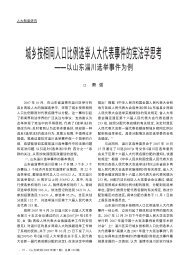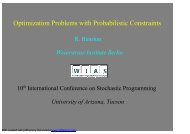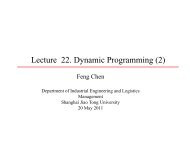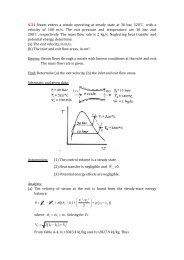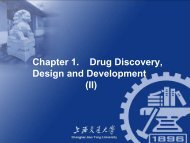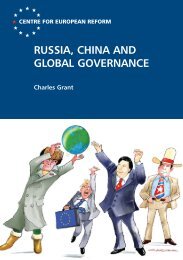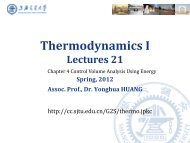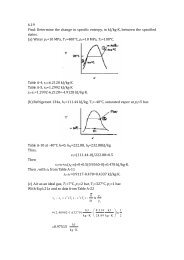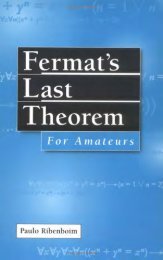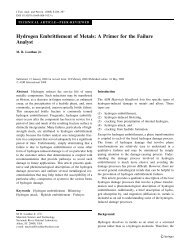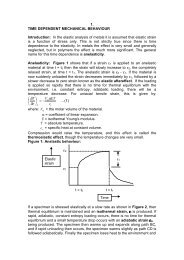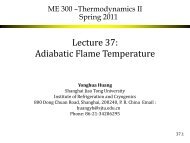The Making of the Apartheid Plan, 1929-1948* - CC
The Making of the Apartheid Plan, 1929-1948* - CC
The Making of the Apartheid Plan, 1929-1948* - CC
Create successful ePaper yourself
Turn your PDF publications into a flip-book with our unique Google optimized e-Paper software.
388 Journal <strong>of</strong> Sou<strong>the</strong>rn African Studies<br />
Downloaded by [Shanghai Jiaotong University] at 18:42 19 September 2012<br />
we need not live toge<strong>the</strong>r in justice [Louw’s emphasis] with o<strong>the</strong>r ethnic groups; when<br />
<strong>the</strong>y come to believe that mere survival is <strong>the</strong> chief issue, not a just existence.’<br />
In a vivid passage he posed this question: ‘Can a small volk survive for long, if it<br />
becomes hateful, even evil in <strong>the</strong> eyes <strong>of</strong> <strong>the</strong> best <strong>of</strong> its members and also to people outside<br />
its fold?’ <strong>The</strong> volk, he warned, ran <strong>the</strong> risk <strong>of</strong> <strong>the</strong> withdrawal <strong>of</strong> allegiance by a critical<br />
number <strong>of</strong> intellectuals if it yielded to <strong>the</strong> ‘final temptation’ <strong>of</strong> abandoning <strong>the</strong> quest for<br />
‘survival in justice’ and preferred ‘mere survival’. In <strong>the</strong> case <strong>of</strong> a small nation like <strong>the</strong><br />
Afrikaners this could have a fatal effect. But he did not despair that ultimately Afrikaner<br />
survival would come to be based on moral values. As he phrased it: ‘I believe that <strong>the</strong><br />
greatest, almost mystical crisis <strong>of</strong> a volk is that in which it is reborn and re-emerges young<br />
and creative; <strong>the</strong> “dark night <strong>of</strong> <strong>the</strong> soul” in which it says: “I would ra<strong>the</strong>r go down than<br />
survive in injustice”.’<br />
Because van Wyk Louw remained a staunch member <strong>of</strong> <strong>the</strong> Afrikaner Broederbond and<br />
supporter <strong>of</strong> apar<strong>the</strong>id he has been judged negatively. 68 Ultimately, however, his status as<br />
a critic revolves around <strong>the</strong> question <strong>of</strong> whe<strong>the</strong>r he could envisage a point where <strong>the</strong> volk<br />
deserved to go under. In this essay, Louw refuses to go down <strong>the</strong> route <strong>of</strong> ethnic survival<br />
at all costs. His argument about survival in justice was a moral argument. Put differently,<br />
<strong>the</strong> Afrikaner people were not entitled to use extreme measures to maintain <strong>the</strong>ir hold on<br />
power.<br />
<strong>The</strong>re was ultimately no justification for a policy aimed at ensuring survival that<br />
constantly and consistently flouted liberal values. Van Wyk Louw died too early – in 1970<br />
– for judgement to be passed on whe<strong>the</strong>r he would have denounced nationalism and<br />
apar<strong>the</strong>id. During <strong>the</strong> 1980s, André duToit and o<strong>the</strong>r members <strong>of</strong> a new generation <strong>of</strong><br />
Afrikaner academics could, in urging <strong>the</strong> abandonment <strong>of</strong> apar<strong>the</strong>id, draw on van Wyk<br />
Louw’s work to do so. 69 In <strong>the</strong> end, <strong>the</strong> seemingly parallel lines <strong>of</strong> liberalism and liberal<br />
nationalism did meet. 70<br />
<strong>The</strong> Crystallisation <strong>of</strong> Apar<strong>the</strong>id<br />
In May 1944, D. F. Malan and his closest political associate, Paul Sauer, <strong>of</strong>fered <strong>the</strong> first<br />
extended defence <strong>of</strong> apar<strong>the</strong>id in parliament. <strong>The</strong>ir ideas were far removed from <strong>the</strong> racial<br />
ideology and xenophobia propounded at this time on <strong>the</strong> continent <strong>of</strong> Europe. Instead <strong>the</strong>y<br />
were firmly rooted in <strong>the</strong> Cape Afrikaner experience <strong>of</strong> slavery, with its ideology <strong>of</strong><br />
paternalism, and British colonialism, with its stress on indirect rule and trusteeship. In his<br />
first mention <strong>of</strong> <strong>the</strong> term ‘apar<strong>the</strong>id’, Malan called for a republic based on <strong>the</strong> policy <strong>of</strong><br />
‘apar<strong>the</strong>id and trusteeship, made safe for <strong>the</strong> white race and <strong>the</strong> development <strong>of</strong> <strong>the</strong><br />
non-white race, according <strong>the</strong>ir own aptitude and abilities.’ 71 As <strong>the</strong> historian Kenneth<br />
Robinson points out, <strong>the</strong> British notions <strong>of</strong> trusteeship were influenced by <strong>the</strong> thoughts <strong>of</strong><br />
a seminal liberal thinker, John Stuart Mill. He argued in 1859 that rule by a dominant<br />
country or ‘by persons delegated for that purpose’ was as legitimate as any o<strong>the</strong>r, if it<br />
68 For analyses <strong>of</strong> Louw’s ideas, see in particular J. J. Degenaar, Moraliteit en Politiek (Cape Town, Tafelberg, 1976),<br />
pp. 55–91; G. Olivier, N. P. van Wyk Louw (Cape Town, Human and Rousseau, 1992); M. Sanders, ‘Complicities:<br />
On <strong>the</strong> Intellectual’ (PhD dissertation, Columbia University, 1998); and J. C. Steyn, Van Wyk Louw, (Cape Town,<br />
Tafelberg, 1998). <strong>The</strong> interpretations <strong>of</strong> Degenaar and Steyn are largely positive. For an effective response to<br />
Olivier’s jaundiced view, see J. C. Kannemeyer, Ontsyferde Stene (Stellenbosch, Inset, 1996), pp. 62–76.<br />
69 A. du Toit, Sondes van die Vaders (Cape Town, Rubicon, 1982).<br />
70 I elaborate on some <strong>of</strong> <strong>the</strong>se issues in my ‘Critical Afrikaner Intellectuals and Apar<strong>the</strong>id,’ South African Journal<br />
<strong>of</strong> Philosophy, 19, 4 (2000), pp. 307–320; for criticism, see H. Giliomee, <strong>The</strong> Afrikaners: Biography <strong>of</strong> a People<br />
(London, Hurst and Co., 2003), pp. 447–486.<br />
71 Louw, Dawie, p.48.



